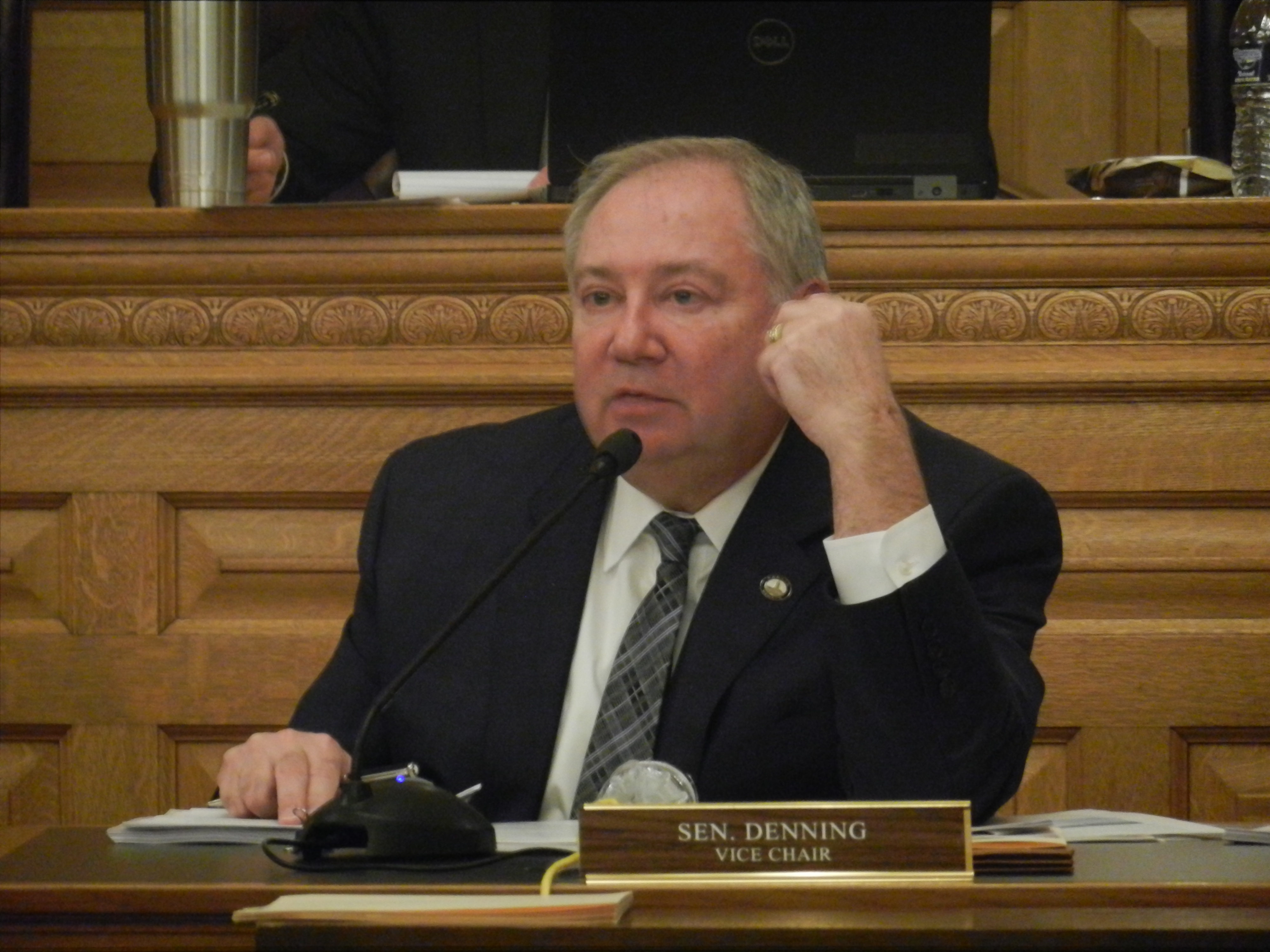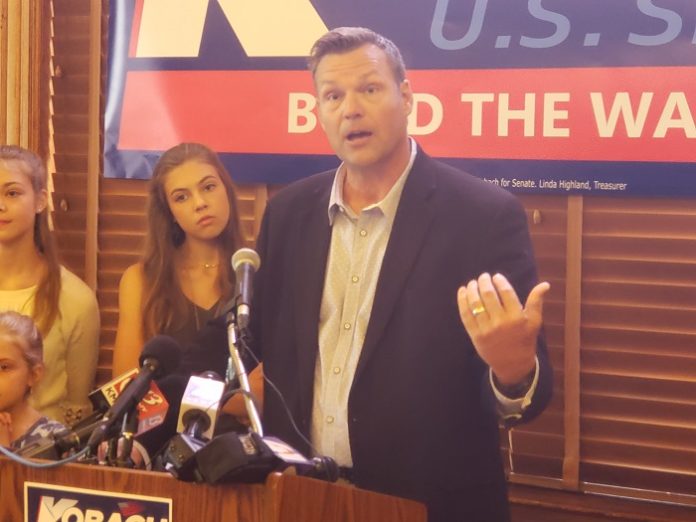(Updated to include comments from Kobach on Monday and comments from former consultant, pollster as well as a Republican legislator)
Former Kansas Secretary of State Kris Kobach on Monday announced plans to run for the U.S. Senate, a move that spices up the Republican primary and set off immediate blowback from would-be allies in the GOP.
Just eight months removed from an unsuccessful campaign for Kansas governor, Kobach is joining a field that already includes Kansas Treasurer Jake LaTurner and former Johnson County Commissioner Dave Lindstrom.
The field could include Congressman Roger Marshall, Senate President Susan Wagle, conservative lobbyist Matt Schlapp and Kansas Chamber of Commerce executive Alan Cobb. The race would be Kobach’s sixth campaign for public office since running for the city council in Overland Park in 1999.
“Our country is in a period of turmoil,” Kobach told a room packed with supporters at the Riverfront Community Center in Leavenworth.

“Our borders are being overrun. The calls for socialism on the left are getting louder and louder and they don’t stop,” Kobach said.
“If not for the election of Donald Trump I would argue that we would be in a deep downward spiral right now. That’s the bright spot that we’ve seen the past few years.”
Some Republicans were speculating that a Kobach candidacy might prompt U.S. Secretary of State Mike Pompeo to join the race, a move that could potentially clear the field.
“I don’t think he will get into the race,” Kobach said of Pompeo.
“If he did, I would want to talk to Mike and see what he’s thinking,” he said. “At the end of the day, we all have to try to serve where we can add value.
“If he can make the case to me that it would be better for him to be (in the Senate) and for somebody else to be at the secretary of state post, then I’d listen to him.”
A divisive figure in Kansas and national politics, Kobach’s candidacy is seen as a potential liability to Republicans, giving Democrats an opportunity to win their first Senate race in Kansas since 1932.
His candidacy was already stirring fears about the fallout it would have on the Republican Party and the impact it might have on down-ballot candidates.
Senate Majority Leader Jim Denning, who is up for re-election next year, called for Kobach not to run for the Senate.

“Kobach had his shot, fell short, and was handed defeat in the 2018 general election,” Denning said in a statement. “Kris needs to step aside and support — not obstruct — the strengthening of the Republican Party.”
Kobach said a Senate race is very different from a governor’s race, saying that Democrats have been able to use the education issue against Republicans over the years – a reference to his own campaign for governor last year.
“That particular tactic that the Democrats have used so effectively doesn’t apply to in Senate races because the United States government is not the primary funder of Kansas schools,” Kobach told reporters after the announcement.
He added that the electorate in 2020 is different, saying that it would be twice as large during a presidential election than it was during the governor’s race.
“You have a completely different set of voters.”

However, even some of Kobach’s most ardent supporters over the years are skeptical that that this is a smart move – even for someone they still hold in high regard.
Patricia Stoneking, former president of the Kansas State Rifle Association, has been a longtime Kobach supporter and still shares his political values.
And while she believes Kobach could win a crowded Republican primary, she fears that he would lose the general election and cost Republicans a seat in the U.S. Senate.
“I have a lot of anxiety — or angst if you will — about how the race would go,” said Stoneking, who is now retired.
“I am not sure who is encouraging Kris to make this move, but I just don’t think he can do it,” she said.
“I’ve talked to a number of other people who have always supported him in the past as well, and they agree with my assessment,” she said.
“They don’t think he can win the general election. I think we need to get behind someone that has the ability to go against whoever it is that is going to win the Democrat nomination for Senate.”
On Monday morning, the National Republican Senatorial Committee issued a statement criticizing a Kobach candidacy.
“Just last year Kris Kobach ran and lost to a Democrat. Now, he wants to do the same and simultaneously put President Trump’s presidency and Senate Majority at risk,” said NRSC spokeswoman Joanna Rodriguez.
“We know Kansans won’t let that happen and we look forward to watching the Republican candidate they do choose win next fall,” Rodriguez said.
Kobach has dismissed reports that national Republicans would work against him during the primary in order to save the seat. He did it again Monday when confronted by the most recent statement issued by the NRSC.
“I don’t think the NRSC has said anything official,” he said. “If the argument is made that it would hurt President Trump (and) that somehow he might lose Kansas, the person saying that clearly is ignorant of a lot of things.”
Republican state Rep. Ron Highland of Wamego attended the announcement in Leavenworth. He’s still sticking with Kobach.
“We’re in a situation in our country and in our state where we need some principle people who understand the Constitution and are willing to stand up and not bow down,” Highland said. “Kris is one of those people.”
Republican pollster J.D. Johannes, who advised Kobach in last year’s governor’s race, cautions about the type of voters who participate in Senate race.
“Historically, governor and U.S. Senate elections are not as highly correlated to partisan trends as presidential and U.S. House elections,” Johannes said in an email.
For instance, a red state like Kansas will elect Democrats like Laura Kelly and Kathleen Sebelius governor while another red state like Montana will elect Democrat Jon Tester to the U.S. Senate, he said.

Elections for president, Congress and legislature tend to be driven along party lines, he said.
Just because Kansas voters might go for Trump doesn’t mean they will go Republican in the Senate race where they might be more likely to vote for the candidate over party.
“Kris has been tested in high-partisan elections like secretary of state and U.S. House and a low correlation contest like governor with mixed results,” he said.
“A lower-partisan correlation election like U.S. Senate may not play to Kris’ strengths as a candidate,” he said.
Since his unsuccessful campaign for governor, Kobach — with close ties to President Donald Trump — has been playing increasingly on the national political stage.
He so far has been unsuccessful in working with the Trump administration to put a citizenship question on the census, and he was mocked nationally after a list of demands he made to become Trump’s immigration czar was leaked to The New York Times.
Among other things, Kobach wanted walk-in privileges to the Oval Office, a rank of assistant to the president, a staff of seven and a jet to visit the border every week.
And recently, the political site Axios revealed nearly a hundred documents used to vet candidates for the Trump administration, including those showing Kobach’s vulnerabilities as a potential nominee for Homeland Security secretary.
Among other things, the document included allegations from his 2004 congressional race that he aligned himself with groups that had connections to white supremacists.
Kobach also serves as a board member and general counsel with We Build the Wall, a group trying to build a privately funded border wall.
The Florida Department of Agriculture and Consumer Services recently started an investigation into the group.
Kobach also will go into the race with a reputation for an inability to raise lots of money for a statewide campaign.
Kobach’s gubernatorial campaign relied heavily on running mate Wink Hartman, a Wichita oilman who last year loaned the candidate more than $2 million.
Colin Hoffman is a Republican consultant who advised Kobach’s gubernatorial campaign during the general election.
He questioned what kind of campaign infrastructure Kobach might have but added it might not make a difference in a primary.
He noted that Kobach changed consultants during the primary and still narrowly defeated former Gov. Jeff Colyer.
“Kris Kobach’s playbook is well-known to folks in Kansas,” Hoffman said. “He’ll come into this race without the organization or discipline of other candidates, and he’ll have the same fundraising issues that plagued the 2018 campaign.
“However, it didn’t matter in his last primary victory,” Hoffman said, “and I’m not sure how much it matters now.”
Kobach started his campaign hours before making an announcement, filing a report with the Federal Election Commission that misspelled his name as “Chris.”
Kobach’s bid for the Senate will not include Republican state Rep. J.R. Claeys of Salina, who managed Kobach’s campaign for governor last year. Claeys, who was not at Monday’s event, declined comment on not being part of the Senate campaign.
Democrats, meanwhile, weren’t ready to write off a Kobach candidacy.
“I think it’s a tough race whoever the Republicans nominate. We’re going to have to run hard,” said National Democratic Committeeman Chris Reeves.
“There will be a lot of Trump voters who come out to support Trump,” Reeves said, “and Kris Kobach is the candidate most in line with Trump that Republicans can offer.”
Republican consultant Jared Suhn noted that Kobach has already lost twice to Democrats – Dennis Moore in the 3rd Congressional District in 2004 and Kelly in last year’s governor’s race.
“We can’t let him do that to conservatives again,” Suhn said. “Our Senate majority and the president’s agenda are at risk.”
Stoneking had hoped that Kobach would have pursued other avenues such as a job with the Trump administration. She’s concerned about his future.
“I would just prefer not to see a bloodbath of a race, which it’s liable to be,” Stoneking said. “I think every time Kris runs and loses, it’s hurtful to him and his future. I don’t want to see him becoming diminished if he continues to lose races.”













